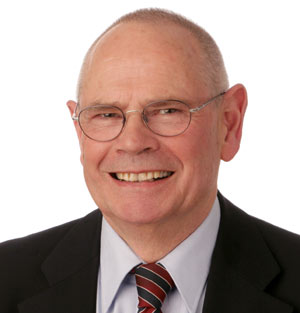|
 |
|
Jan Eduard Harff, German, a marine geologist of the Leibniz-Institute for Baltic Sea Research Warnemunde, currently at the University of Szczecin, Poland. |
How do you feel about winning this award?
This is for me the greatest honor I have ever received. I am personally very touched and moved because I have been working successfully together with Chinese colleagues already for 20 years. I am enjoying this cooperation not only because of the scientific results, but, also because I have met so many good friends during these years. I regard the award not only as a result of my personal achievements. I am sharing the honor with all the colleagues I have had the chance to work with in China, Germany and Poland.
In your opinion, what were the main factors behind your success in the award? I see four factors that have driven the process: First of all, it is the openness to international cooperation of the scientific environment in China, so that my background in Germany and Poland could open the door for the formation of international research teams, integrating Chinese scientists from different institutes. The second factor is international science's increasing interest in the marine realm, along coastal zones as well as in the deep sea. This increasing interest is bounded to the energy and mineral deposit demand, which cannot be supplied by terrestrial sources only. The future points to the sea and space. As a marine scientist, I am in the privileged position to contribute in answering current scientific and societal questions regarding the oceans and the transit zones to the continents, the coasts.
The third factor is the scientific quality of the international research teams we have welded together, consisting of scientists from China, Germany and Poland. The key question here is the integration of forces and the recovery of synergy effects.
Last, but, not least, I think that our effort in education and training of young scientists is acknowledged by the award.
What has been your most important accomplishment in China?
My greatest accomplishment was the development of international and interdisciplinary research teams in order to understand the complex processes at the interface between the continents and the oceans: the river mouth systems, the coastal zones and the continental shelf.
Here, we did bring together experts from the Guangzhou Marine Geological Survey, the Sun Yat-Sen University Guangzhou, the South China Sea Institute of Oceanology at CAS, the Institute of Coastal Zone Research at CAS, the Leibniz Institute of Baltic Sea Research Warnemunde, Germany, and the University of Szczecin, Poland. In the result, we have developed conceptual and numerical models describing marine geological processes. In these models, we have applied not only to reconstruct the environmental changes of the coastal zones in marginal seas. These models allow the generation of future scenarios ahead of a changing climate and the increasing socioeconomic use of the marine realm from the river mouths to the shelf edge. Those scenarios can help in the decision-making within the frame of coastal ocean management.
How has your work in China helped your career to develop in your native country?
The excellent work conditions that we designed for our teams formed the soil to harvest scientific results, which have been published in international journals. These publications are acknowledged as well in Germany and Poland, where I am currently working. At the University of Szczecin, I was appointed as commissioner of scientific relations with Chinese universities and research institutes. This appointment shows the University of Szczecin ascribes high importance to scientific relations with China.
What do you feel about the level of research carried out in China compared with other places around the world?
I wouldn't say there is only one level of research in China. As in all countries, we also see in China differences in the scientific level of its research institutes. There are top addresses next to mean-leveled institutes and scientists. I realize that China is spending great effort to support cutting-edge research in all disciplines, at the universities as well as the research institutes, including the Academy of Sciences.
One of China's important achievements is the establishment of "Key Laboratories" for the development of interdisciplinary top teams crossing institutional boundaries. This establishment is conceptually comparable to the very effective collaborative research centers of the German Research Foundation.
What plans do you have to carry out work related to China in the next five to 10 years?
I plan to continue my research getting a better understanding of coastal and river mouth systems as areas of transit and transformation of matter and energy. We have to trace back the pathway of sediments from the source on the continent to the sink in the ocean.
These "source-to-sink models" are needed for mineral exploration as well as for coastal zone management. In this respect, my dream is to continue cooperation with different institutes in China and Europe comparing the Chinese marginal seas with other parts of the world's oceans. This cooperation shall be based on scientific competence and personal friendship of the acting scientists.
